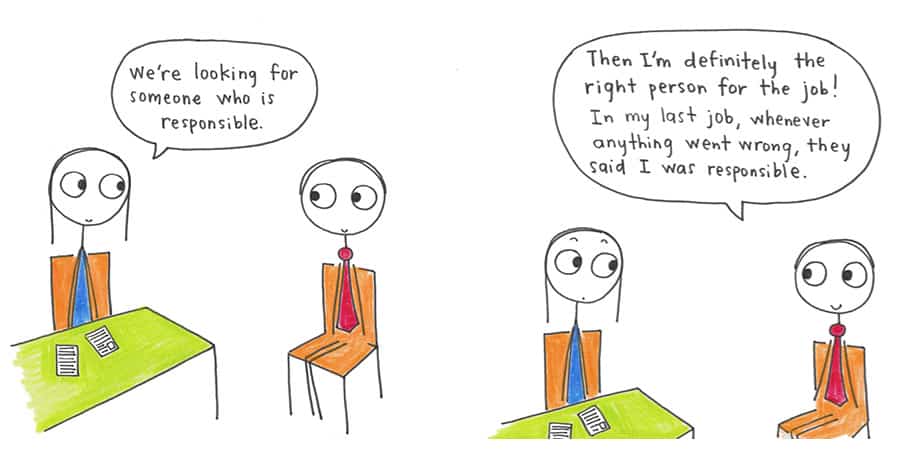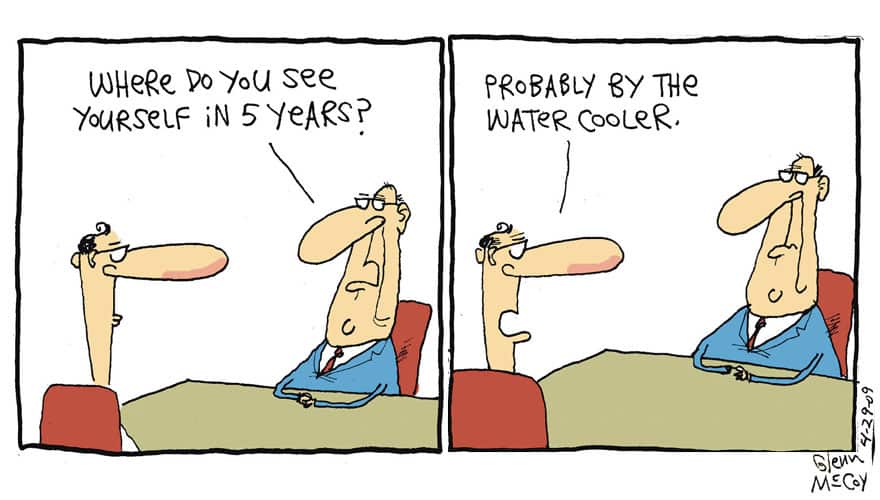The assessment interview is a set part of every assessment and in many respects appears to be the first introductory interview during the application procedure. It makes sense to be a bit nervous for an assessment interview, but realize that you have the freedom to direct the conversation. It is not a one-way street.
Your interview partners (usually one or two behavioral experts) will look at your personality, background, career, ambitions, and motivations during the interview. In a relatively short time (2 to 3 hours), they try to form as complete a picture of you as possible. The trap that many people get caught in is that they think the selection expert/psychologist is also a psychic. They know that I’m right for the job, don’t they? My résumé says it all, right? You have to help them get a clear picture.

The first impression is important. You are being judged before the conversation has even started. Studies show that how you come across is at least as important as the content of your answers. Your clothing, behavior, attitude, voice, and non-verbal communication all play a part.
In almost every interview, you will encounter questions such as: “You say that you have experience with advising people … can you give an example?” Or “In your application letter, you write that you have experience with … can you give an example?” It is important to prepare well for such questions, because it is difficult to come up with these examples during the interview. You can use the STAR method for this. STAR stands for: Situation, Task, Action, and Result. An R is sometimes added to the abbreviation STAR, which stands for Reflection. By reflecting, you add conclusions to your actions.
Recent past behavior is the best predictor of future behavior. That is the core believe of the STAR method. The bottom line is that you need to make clear why you are suitable for the position you are applying for by referring to actual (work) behavior.
In preparation for the job interview, it is wise to practice the STAR method at home, e.g. with a friend or partner. Try to connect the skills and characteristics required for the position to your experiences. Choose three or four skills or characteristics from the job profile that are the most important in your opinion. Describe an appropriate (work) situation from the recent past for each skill or trait. Next, consider the role you had in it, what actions you personally took, and finally, what the achieved result was. You can still reflect on how effective you were and what you might do differently in the future.
You will be asked a lot of questions during the interview but it is also very important to ask questions yourself: to obtain more information about the potential employer but also to express your interest in the job and the company.
Some companies use aptitude tests as part of their interview process, this certainly depends on the sorts of companies you’re applying to. It’s normally the larger corporate companies that are more likely to use them as an initial screening technique – so only do this if these are the roles you’re applying for. There are a few variations in the style of aptitude tests you might be asked to do – including numerical reasoning, verbal reasoning, diagrammatic reasoning, Situational Judgement, and many more.
Tips for a successful interview
- Know what is in your application letter and résumé.
- Do not tell lies or half truths.
- Use specific examples from the recent past.
- Listen carefully and make contact (nod and take notes).
- Remain having eye contact in a relaxed manner; this ensures keeping the interviewers attention.
- Don’t allow yourself to be provoked: say what you want to in a mature and assertive way and if necessary ask for clarification.
- Show interest.
- Use humor if you are comfortable with it; know that you can create a relaxed atmosphere in doing so.
- More than one interviewer? Maintain eye contact with both interviewers.
- Take initiative and ask questions: genuine interest really works. Think about this beforehand as well. A candidate who does not have any questions seems less motivated.
- Be enthusiastic and positive.
- Don’t gossip or overshare about previous jobs or superiors.
- Give a firm handshake to exude confidence but an excessively strong handshake may just seem arrogant. In addition, a “bone-breaking” grip can be quite painful for the other party.
- Prevent yourself from constantly selling yourself and do not constantly attempt to persuade the interviewer.
- Avoid the tendency to dilute the impact of your points. I did well, but it could be better because…
- Speaking too much and being too subtle creates a less powerful impression. Be clear and to the point.
- Good insight into your own weak points is important; think about what weaknesses you want to share and how you will do that in advance.
- Spontaneity and authenticity are preferred over mechanical, pre-programmed behavior.
- Read the room. Sometimes you can speak casually and sometimes you can’t. Acting too familiar often does not go over well.
- Keep your posture upright and open: do not sit bent over and do not hold your arms like a shield in front of you.
- Providing too much irrelevant background information is not recommended. Use the KISS principle; keep it short and simple.
- If you really do not know, indicate that you need a bit more time to be able to give a good answer. You do not have to know everything and have an answer to every question.
- Indicate without irritation why you do not want to talk about a certain topic.
- Analyze the job requirements and the blueprint of the company (it can be a good starting point).
Preparing for the interview
Good preparation is half the job. Interview preparation is just like the many intelligence-assessment problems that you have been working on. Practice helps! Recording yourself with a webcam is useful and puts you face to face with yourself.

Choose a question that you want to prepare. Choose an example from the list below:
- Why do you think you are suitable for this position?
- Can you briefly explain a strong point and a less strong point with examples from practice?
- Judgment is an important competence for this function. Can you give an example of where an appeal was made to your judgment?
You will notice that the answers don’t simply roll off the tongue at the first attempt. Even in a completely relaxed situation, it is not common for people to “present themselves” in this way. How does this become more natural and smooth? Simply by doing it. You have to do it more than once: don’t stop until it’s second nature.
The power of positive affirmations
Just like winning sports stars, you have to get into the habit of repeating your positive affirmation or affirmations every day.
Here are 5 positive affirmations to help you smash that job interview:
- I am calm and confident; job interviews are easy.
- I am perfect for this position; I am their ideal candidate.
- I love job interviews, and my energy is contagious.
- I impress interviewers; I stand out above the rest.
- I am an excellent candidate, and I exude capability.
Importantly, although these “tips” can often be effective “right away”, their continuous practice can make us more sustainably confident, and hence successful. In Cuddy’s words, we need to “fake it until we make it”.
Resources:
- Positive Affirmations for Job Interview Success – Chi-Nese
- What You Need to Do to Find Your Ideal Job – Chi-Nese
- 12 What To Do’s When A Job Interview goes wrong – ResumeViking
- The psychology of the job interview – BBC Worklife







